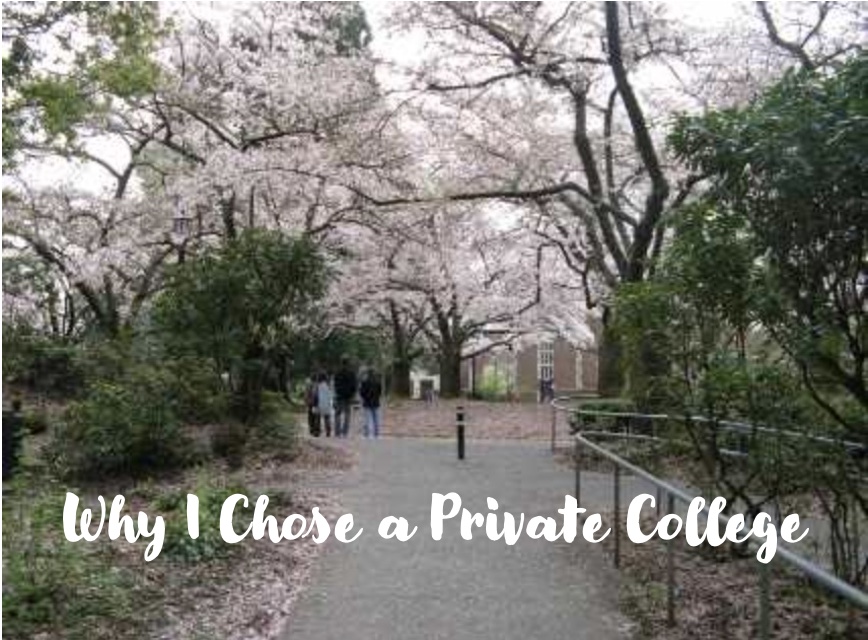Why I Chose a Private College
Wondering why I chose a private college? See why I was happy with that choice. Well no me per se, but other students who have gone through the college admission process. Read what they have to say.
Last updated on March 23, 2025 by College Financial Aid Advice.
Why I Chose a Private College
College tour at Reed College, a private college in Portland, OR
I started my college search around junior year of high school. I thought I wanted to go out of state, but I visited some local public and private schools, and quickly my decision was between a large state school and a small private school within an hour of each other. I based my choice on what the colleges had to offer me and the general feel of being on campus. On paper, the overall cost was going to be about the same for both, so I didn't think it mattered which one I chose as far as cost went.
I ended up choosing the private school; it’s
three years later, and I am drowning in debt. I do not regret the college I
chose, but I do regret the opportunities I did not take advantage of. I am
about to give you the advice I wish I'd been given in high school.
Start applying for scholarships early. And I
mean EARLY. I know for a fact that there are scholarships available to juniors, but if you can start sooner, DO IT! You aren’t going to get
all of them, or even most of them. BIG TIP: Aside from your guidance counselor,
and basic online searches, a MAJOR source for scholarship opportunities is your
college website. I REPEAT, check your college website for financial aid
opportunities. This is something I regret not doing.
Take college courses in high school. If your
high school doesn’t have AP courses (like mine) then you had better be taking
courses for college credit, or you will be way behind the game. I mean, why
wouldn’t you want to take college classes for free? This is a great
opportunity, even if you don’t intend to go to college.
Always have a job. Even if it’s just work study,
you can plan on having a lot of unexpected costs in college. Plus, it’s always
good to have a little extra spending money. You don’t want to get out of college and
not have worked in the past 5 years, or ever.
Choose the school you’re going to love. That’s
right, I said it. It doesn’t matter if you choose public or private. All
schools have financial assistance programs. Private schools have more because
they cost more. The only real difference between the two is the experience. So
make your choice based on whether you want small class discussions vs. large
lecture halls, research papers vs. blue book tests, professors that want to
know you vs. professors that want to do their own studies.
A lot of people are choosing their college based
on cost, and I think that should be a factor, but not the only one. College
should be about an experience, not a paycheck. If you go to the cheapest
school, you run the chance of missing out on the biggest adventure of your life.
Take advantage of all your resources and work hard in high school. After that,
it’s just a matter of choosing your favorite school (and getting in, of
course).
Comment from your friendly team at College
Financial Aid Advice
Thank you Taylor for sharing your tips about
private or public college. Cost is an important factor, which is why it is so
important to apply for financial aid via the FAFSA and for some private schools also
the CSS Profile. Taking AP course gives you a great head start,
and work-study programs are always a plus. Best of luck to
Finding the
Best College for the Best Price
Why I Chose a Private College by Madison from Washington
As a high school senior, it is very important that I find the
college that will best suit me for the lowest price possible. I had five
options: community college, in-state public and private universities, and
out-of-state public and private universities.
Unlike many others, I decided on a very specific major, so my options were
already limited. Community college was already out, because my program of study
required a Bachelor’s degree. Lucky for me, there was a private college
in-state that offered my program. However, when I checked the cost of tuition,
room and board, meal plan, and books, the total came to around $60,000 every
year. Needless to say, my mom began to worry.
So I dug a little deeper, and searched for out-of-state colleges, which would
normally be pretty pricey. Fortunately, I found a private out-of-state college,
Weber State University, about twelve hours away from where I live. Tuition was
one quarter of the cost of the in-state private school. I thought I struck
gold, seeing as how I could get my Bachelor's degree in four years at an out of
state college for the cost of one year at an in-state college.
Next I set up a college visit, which is very important because you get first-hand
information from people who have personal experience at the college, as well as
get a feel for the campus. You can't always get this type of insight from a
website. I learned about many scholarships offered specifically through the
college, which would reduce my tuition by half, and even pay it in full! These
types of scholarships are only offered to out of state students, which gives me
more opportunities to get some of my tuition covered.
Next, I applied for as many outside scholarships
Comment from your friendly team at College Financial Aid Advice
Thank you Madison for sharing your tips on finding the best college for the best price. Sometimes it is surprising when you check out all the options, because your initial impression may be wrong. I’m glad the out of state college is working for you. Best of luck to you.
Private
Schools - The Plentiful Choice
Why I Chose a Private College
by Melissa from Illinois
When I was choosing a school, I had no idea
which route I would take. Would I choose a large state school, a small private
school, a local community college, or just even skip this option completely?
When I was applying, I started with the school of my father, Illinois State
University. This process became quite rigorous and even somewhat hectic with
all of the information required. As I received more and more letters from
schools, I began to notice a pattern of financial help from private schools. I
applied to eight schools total, seven being private schools in Illinois. I was
accepted to all eight and only received scholarships from seven, the private
colleges.
My financial advice overall is to seek out smaller, private schools. The
atmosphere on campus' are more home-like, you meet more people this way, and
these colleges are more willing to give you merit-based scholarships as well as
many other kinds of scholarships.
I am 100% satisfied and happy with my choice to attend a private college because it actually feels like a home away from home with the cost even cheaper than a large state school based on one merit-based scholarship. So, save yourself the trouble of worrying about financial aid when these small institutions are more than willing to give you the money you deserve on your academics. Good luck!
Comment from your friendly team at College
Financial Aid Advice
Thank you Melissa for sharing your story about
private schools. Some have large funds for institutional scholarships that they
offer on either a merit or need basis to students. As more public schools are
short on funds, these private schools can end up as a cheaper alternative to a
4 year public school.
Some of our readers have shared some very
creative solutions to paying for college. Check out their stories at College Financing Tips. Good luck to you.
Help Choose Your College
Thanks to our readers for sharing their thoughts on "why I chose a private college". Read more to help choose your college, and pay for it.
Welcome!
Welcome to College Financial Aid Advice, a website full of information on scholarships and grants, student loans, and other ways to save money at college.
Important Things to Do
Scholarships for 2025 - 2026 - It is never too early or too late to work on your scholarship searches. If you are part of the high school class of 2025, you should work on your scholarship and college search now. See our list of Scholarships for High School Seniors
FAFSA - The official 2025 - 2026 FAFSA is available now. FAFSA.
College Financial Aid Tips
Scholarship Lists An overview of the different types of Scholarship Money for College.
Grants Learn more about grants, the other free money for college.
Need Tuition Help? Reduce the cost of tuition with these college Tuition Assistance Programs.
Tax Credit Claim the American Opportunity Tax Credit.
College Savings Plans Save money for college with these College Savings Plans.
Need a Student Loan? Yes, you qualify for these college Student Loans.
Popular Scholarship Searches
Scholarships for High School Students

